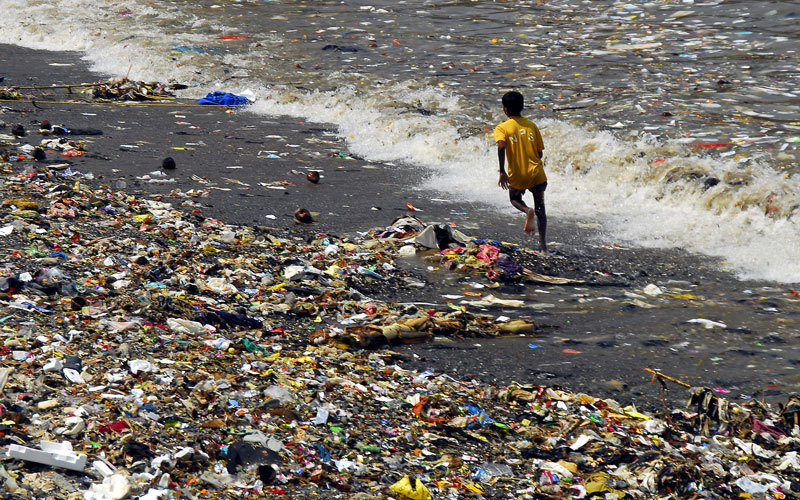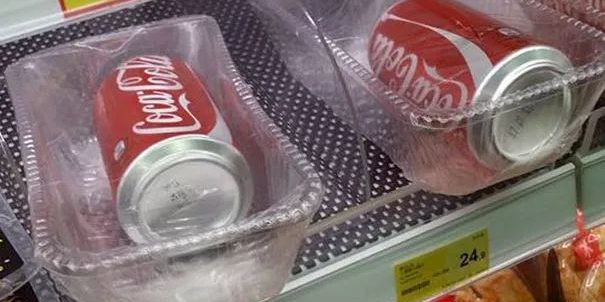pushpixels
Well-known member
what do you think?
i remember as a kid i was confused why my cousins in mexico would need to hold on to glass soda bottles and take them with them when they went to buy a new one. i think we really do need to do this as much as we can. im in the packaging industry (print side) and this more than likely would reduce business but i think its the right thing to do.
i dont like that my job is basically to create trash, or put lipstick on trash.
https://www.apnews.com/74c8d8c2780a43fcb1f05882d28f1442
A new shopping platform announced Thursday at the World Economic Forum aims to change the way we buy many brand-name products.
Loop, as the platform is called, would do away with disposable containers for things like shampoo and laundry detergent from some of the world’s biggest manufacturers. Instead, those goods will be delivered in sleek, reusable containers that will be picked up at your door, washed and refilled.
“Loop is about the future of consumption. And one of the tenets is that garbage shouldn’t exist,” says Tom Szaky, CEO of the Trenton, New Jersey-based international recycling company TerraCycle, which is behind Loop.
“Removing plastics from the ocean is not enough. We need to get at the whole idea of disposability and single-use items,” says Szaky. “We’re going back to the milkman model of the 1950s. You buy the milk but the milk company owns the bottle, which you leave in the milk box to be picked up when you’re done with it.”
Companies partnering with Loop include Nestle, Procter & Gamble, PepsiCo and other top brands.
“Our goal is that by 2030, all of our packaging will be reusable or recyclable,” says Virginie Helias, vice president and chief sustainability officer at Procter & Gamble. Loop, she said, “is a very new idea and somewhat risky because no one has tried it. But the response has been very positive, and we’ve selected 10 of our brands to be a part of the pilot project, with a plan to add more later pending positive results.”
Pantene shampoo, for instance, “will come in a beautifully decorated, lightweight-aluminum pump container,” Helias says. “Tide in the U.S. will come in a stainless-steel bottle with a durable twist cap. Cascade will come in ultra-durable packaging. Crest mouthwash will come in a glass bottle. The idea is ultra-durability, convenience and also ultra-luxurious packaging.”
Haagen-Dazs Ice Cream, a Nestle product, will be delivered in a posh, double-walled, stainless-steel tub designed to keep ice cream cold longer.
And instead of adding dirty disposable diapers to landfills, soiled diapers can, starting only in the Paris area, be placed in sleek, durable diaper containers. When a container is filled, Loop will pick it up and deliver a clean, empty one. New technology allows Loop to process and recycle the dirty diapers, something TerraCycle has already started doing in Amsterdam.
“We have only one planet, and we have to take care of it for the long term,” says Laurent Freixe, CEO of the Americas Region of Nestle, which hopes to do away with all its non-recyclable packaging by 2025. “We want to strive for Zero Waste at both the production and consumption level. Loop is so innovative that we felt we had to be a part of it and learn from it.”
The rise of the “Zero Waste” movement and concern about the environment has led many businesses to try to reduce packaging and single-use containers. Loop is unusual in its international scope and the size of the companies participating.
Initially, Loop will offer about 300 products, with plans to add to the list later. According to TerraCycle, partners include Procter & Gamble, PepsiCo, Nestle, Unilever, Mars Petcare, The Clorox Company, The Body Shop, Coca-Cola, Mondelez International, Danone, Jacobs Douwe Egberts, BIC, Nature’s Path, Thousand Fell, Greenhouse, Grilliance, Preserve, Carrefour, UPS and the sustainable-resource management company Suez.
Greenpeace, which has criticized many big manufacturers for creating much of the plastic waste polluting the world’s oceans, joined in a panel about sustainable consumption at which Loop was announced in Davos, Switzerland, on Thursday. Jennifer Morgan, international executive director of Greenpeace, said beforehand, “While Greenpeace welcomes the aim of the Loop Alliance to move away from throwaway culture and disposability ... what the platform will mean for the environment depends on whether corporations worldwide are actually ready to change their business models, or if this effort just becomes a distracting side project to generate positive PR.”
She warned that most businesses behind the initiative are still expanding production of single-use plastic, although company representatives focused on the progress they have vowed to make in adopting more sustainable packaging.
Loop is slated to launch this spring in New York, New Jersey and Pennsylvania, and also in Paris and some of its suburbs. Shoppers will be able to buy Zero-Waste products from the Loop website to be delivered to their homes in specially designed shipping totes, and, eventually, at participating retailers, such as Carrefour grocery stores in Paris.
Loop intends to expand to the U.S. West Coast, Toronto and the United Kingdom by the end of this year or early 2020, followed by Japan — ideally in time for the 2020 Olympics, Szaky says.
“It means more delivery trucks, but far fewer garbage trucks,” he says.
i remember as a kid i was confused why my cousins in mexico would need to hold on to glass soda bottles and take them with them when they went to buy a new one. i think we really do need to do this as much as we can. im in the packaging industry (print side) and this more than likely would reduce business but i think its the right thing to do.
i dont like that my job is basically to create trash, or put lipstick on trash.
https://www.apnews.com/74c8d8c2780a43fcb1f05882d28f1442
A new shopping platform announced Thursday at the World Economic Forum aims to change the way we buy many brand-name products.
Loop, as the platform is called, would do away with disposable containers for things like shampoo and laundry detergent from some of the world’s biggest manufacturers. Instead, those goods will be delivered in sleek, reusable containers that will be picked up at your door, washed and refilled.
“Loop is about the future of consumption. And one of the tenets is that garbage shouldn’t exist,” says Tom Szaky, CEO of the Trenton, New Jersey-based international recycling company TerraCycle, which is behind Loop.
“Removing plastics from the ocean is not enough. We need to get at the whole idea of disposability and single-use items,” says Szaky. “We’re going back to the milkman model of the 1950s. You buy the milk but the milk company owns the bottle, which you leave in the milk box to be picked up when you’re done with it.”
Companies partnering with Loop include Nestle, Procter & Gamble, PepsiCo and other top brands.
“Our goal is that by 2030, all of our packaging will be reusable or recyclable,” says Virginie Helias, vice president and chief sustainability officer at Procter & Gamble. Loop, she said, “is a very new idea and somewhat risky because no one has tried it. But the response has been very positive, and we’ve selected 10 of our brands to be a part of the pilot project, with a plan to add more later pending positive results.”
Pantene shampoo, for instance, “will come in a beautifully decorated, lightweight-aluminum pump container,” Helias says. “Tide in the U.S. will come in a stainless-steel bottle with a durable twist cap. Cascade will come in ultra-durable packaging. Crest mouthwash will come in a glass bottle. The idea is ultra-durability, convenience and also ultra-luxurious packaging.”
Haagen-Dazs Ice Cream, a Nestle product, will be delivered in a posh, double-walled, stainless-steel tub designed to keep ice cream cold longer.
And instead of adding dirty disposable diapers to landfills, soiled diapers can, starting only in the Paris area, be placed in sleek, durable diaper containers. When a container is filled, Loop will pick it up and deliver a clean, empty one. New technology allows Loop to process and recycle the dirty diapers, something TerraCycle has already started doing in Amsterdam.
“We have only one planet, and we have to take care of it for the long term,” says Laurent Freixe, CEO of the Americas Region of Nestle, which hopes to do away with all its non-recyclable packaging by 2025. “We want to strive for Zero Waste at both the production and consumption level. Loop is so innovative that we felt we had to be a part of it and learn from it.”
The rise of the “Zero Waste” movement and concern about the environment has led many businesses to try to reduce packaging and single-use containers. Loop is unusual in its international scope and the size of the companies participating.
Initially, Loop will offer about 300 products, with plans to add to the list later. According to TerraCycle, partners include Procter & Gamble, PepsiCo, Nestle, Unilever, Mars Petcare, The Clorox Company, The Body Shop, Coca-Cola, Mondelez International, Danone, Jacobs Douwe Egberts, BIC, Nature’s Path, Thousand Fell, Greenhouse, Grilliance, Preserve, Carrefour, UPS and the sustainable-resource management company Suez.
Greenpeace, which has criticized many big manufacturers for creating much of the plastic waste polluting the world’s oceans, joined in a panel about sustainable consumption at which Loop was announced in Davos, Switzerland, on Thursday. Jennifer Morgan, international executive director of Greenpeace, said beforehand, “While Greenpeace welcomes the aim of the Loop Alliance to move away from throwaway culture and disposability ... what the platform will mean for the environment depends on whether corporations worldwide are actually ready to change their business models, or if this effort just becomes a distracting side project to generate positive PR.”
She warned that most businesses behind the initiative are still expanding production of single-use plastic, although company representatives focused on the progress they have vowed to make in adopting more sustainable packaging.
Loop is slated to launch this spring in New York, New Jersey and Pennsylvania, and also in Paris and some of its suburbs. Shoppers will be able to buy Zero-Waste products from the Loop website to be delivered to their homes in specially designed shipping totes, and, eventually, at participating retailers, such as Carrefour grocery stores in Paris.
Loop intends to expand to the U.S. West Coast, Toronto and the United Kingdom by the end of this year or early 2020, followed by Japan — ideally in time for the 2020 Olympics, Szaky says.
“It means more delivery trucks, but far fewer garbage trucks,” he says.













